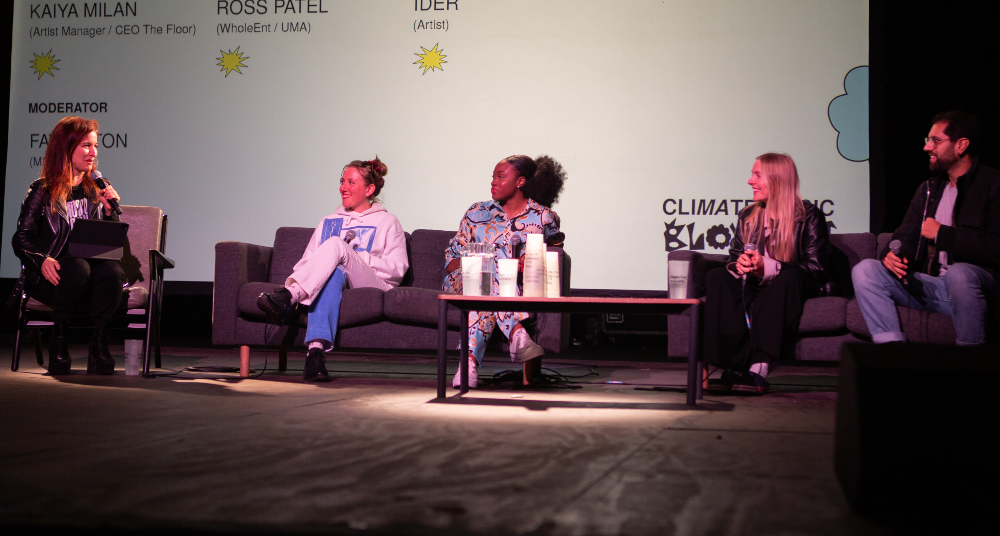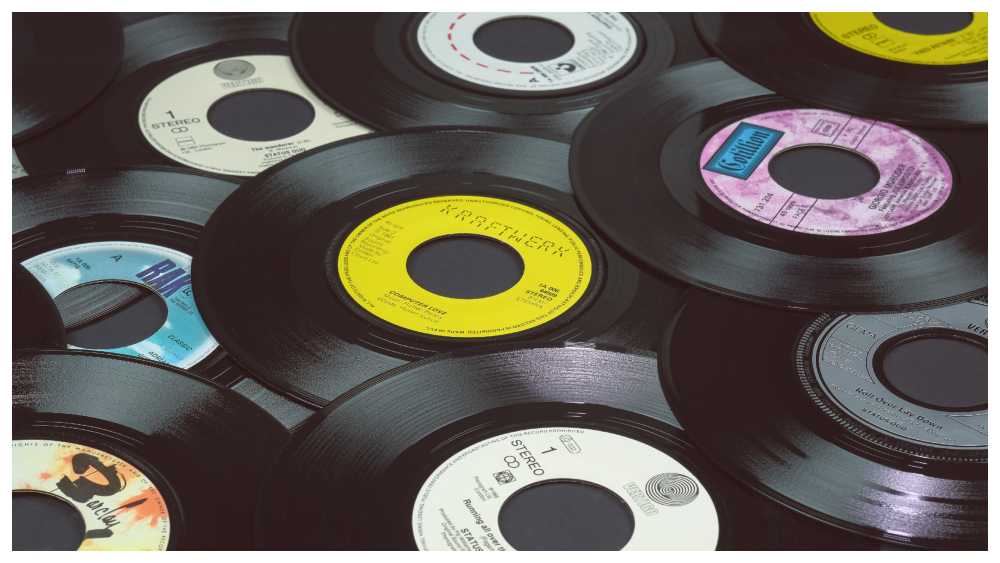It may once have been up for debate, but the fact that we are in the middle of a climate emergency is now undeniable. All of us will soon have to face up to the sheer scale of the task ahead, and the music business is no different.
Since launching in 2019, Music Declares Emergency has been bringing together artists, professionals and organisations to help the music industry become greener. As their current campaign points out, there can be no music on a dead planet.
For co-founder Fay Milton, also drummer in post-punk band Savages, it is the latest step in a journey that may have been inspired most recently by reading Naomi Klein’s This Changes Everything, but firmly had its roots in her childhood. ‘Reading that book was like taking the pill in Matrix where you begin to see the reality,’ she remembers, ‘I could either go back, block it out and forget about it or I could live in the real world and do something about it.’ Thankfully, she opted for the latter.
As Glasgow’s COP26 approached, last month saw many of music’s finest and most imaginative minds brought together for an event at Hackney’s suitably named EartH venue. The Climate Music Blowout played host to a series of conference panels which cast a keen eye on many different facets of the industry, from manufacturing and sustainability, through to tour routing and streaming. Throughout the day, the pressing need for change was a reoccurring theme, and for many its clear change isn’t coming quickly enough.
'It’s just the state of music at the moment, 80 percent of all our revenue comes from performing live, and you feel completely powerless to change that.'
Of course, neither the campaign, nor the cause, are new. Even in the last few years, artists have found a new confidence in standing up and speaking out. From The 1975’s collaboration with Greta Thunberg to Coldplay’s forthcoming use of kinetic dance floors to power each concert — one of a host of ideas in their plan for a fully sustainable tour next year — attention is being firmly fixed on the subject.
But artists are only one cog on the industry wheel, and many others have a part to play. As the vinyl boom continues to show no sign (yet) of slowing down, the high energy usage in the act of manufacturing them make it an obvious area of interest. For Karen Emanuel, chief executive of Key Production, research into degradable vinyl and carbon-balanced products is key, while Drew Hill, managing director of Proper Music Group, points out how the current delivery method of that vinyl is flawed. ‘It’s all made on the continent and is simply travelling too far to get to a customer,’ he pointed out at the conference. Some artists are already starting to explore new ideas, IDLES being one such band that are using vinyl off-cuts, leftovers and damaged records to fashion their new Ecomix vinyl.
Electronic pop duo IDER have taken a different route. ‘We did an older album in a heavyweight vinyl and CD, which weren’t made in any kind of eco-friendly way,’ explains one half of the duo, Megan Markwick. ‘We made sure we did it in a much better way this time round, using vegan ink and biodegradable materials as much as possible.’ In the Netherlands, ‘green’ vinyl shows a potentially huge decrease in environmental impact — estimated at around 60 percent less — just one step along the path in revamping the increasingly outdated historical method of producing vinyl. In a climate where — typically — 80 percent of sales for a number one album are still physical, the urgency is stark.
‘Have the conversation about tour routing with your agent and your manager early, and don’t take no for an answer.’
The reliance on physical sales in a digital age is a hot topic. Under the current chart rules, chasing a high position comes at a huge cost. ‘One CD sale is worth 1500 streams,’ explained Peter Quicke, co-chief executive of Ninja Tune. ‘Using ‘bundles’ is just wasteful consumerism to get into the charts. If we can change the chart rules to make streams count for more, then there is less motivation to push multi-formats when fans only need one.’ But while many may be looking forward to the end of the bundle, for others it seems to shine a light on the fact that many artists and songwriters feel underpaid by streaming platforms. In fact, many in attendance feel is the clear correlation between the streaming underpayment and wider environmental damage.
For Milton, it is simple. ‘If musicians got properly remunerated for their music, then they wouldn’t have to create tons of merch,’ she says, ‘and they wouldn’t have to go on these epic long tours that are not healthy for musicians, or for creativity.’ Charlie Wayne, drummer in Black Country, New Road, wholeheartedly agrees. ‘It’s just the state of music at the moment, 80 percent of all our revenue comes from performing live, and you feel completely powerless to change that.’ The irony of being forced to do something that’s unsustainable for the planet in order to sustain a career is not lost on him.
Megan Markwick captures the mood in camp when she explains, ‘It’s not like it was twenty years ago. We have a lot of streams on Spotify and are completely broke. I feel like we’re going to wake up one day and be like, ‘Do you remember when we had to do that?’ Her bandmate, Lily Somerville, puts it in even more simple terms, ‘For us not to tour all the time, the streaming services need to pay us properly.’
‘We do have the power to challenge big business. Maybe not to the extent of having kinetic dance floors, but certainly to veto plastic bottles on riders and the like.’
It’s not easy being ethical, of course. ‘There used to be this concept of not selling out,’ points out Milton at one point during the conference, before asking to a predictably warm response, ‘Maybe we should bring it back?’
‘We do have the power to challenge big business,’ states Markwick. ‘Maybe not to the extent of having kinetic dance floors, but certainly to veto plastic bottles on riders and the like.’ Perhaps we will see artists starting moving towards only licensing tracks to ‘ethical’ businesses in the same way that sports teams and organisations are slowly turning their back on taking advertising deals from ‘unhealthy’ lifestyle brands. It’s all part of a series of infinitely small steps that will — in any hope — will all add up if replicated across the industry.
Many feel that one of the biggest opportunities is around the touring itself. ‘Even though we love touring and playing shows, you can’t deny the impact of touring,’ says Charlie Wayne, ‘but hopefully on this latest tour, we’re offsetting all the carbon released when we travel.’ Admitting that Black Country New Road are in a more fortunate position than others, he continues, ‘We’re not Ed Sheeran, but a lot of bands don’t make any money from touring at all. At least we can make sure that some of the money we make goes towards what it should be spent on.’
‘It’s more a question of ‘what is even an option’ for a band like us?’ asks Lily Somerville. ‘Of course, we could say we don’t want to tour, or only do a certain amount of it. But if that is the biggest platform for us to grow and develop, and we’re not getting the income support elsewhere, then that is the biggest sacrifice of all.’
When asked for what advice she would give to artists starting out today, Fay Milton keeps it simple. ‘Have the conversation about tour routing with your agent and your manager early, and don’t take no for an answer,’ she says, before adding a caveat, ‘But also, having said that, don’t beat yourself up as well. Have the conversation and do your best. We don’t have electric planes!’
Other positive actions seem to be within reach nowadays. Whether that’s opportunities around venues supplying high-quality in-house equipment, including lighting and decor, or whether in the future band merchandise can begin to replace the need for physical music — free unique download codes being stitched into t-shirts was one idea — it is where creativity meets necessity that progress may well be made.
'I don’t think any of us should consider ourselves a hero for doing something which should have been dealt with a very long time ago. We’re not going to be the people who are going to fundamentally suffer from climate change.'
One thing is for sure, the conversation has begun in earnest. ‘When I first brought it up with my team that I wanted to try and do less flights whilst touring, everyone looked at me like I was insane,’ laughs Milton, at pains to underline that it didn’t cause any arguments within the band. ‘But now I think if someone brings it up then it has to be taken seriously. Things have really changed.’
That’s a view that Charlie Wayne agrees with, ‘We’re definitely in the right sort of place, but it’s also a conversation that’s happening in parallel with the world spiralling completely out of control,’ he points out. ‘Musicians like us, people like us, we’ve got relatively privileged backgrounds globally. We’re able to go on holiday and travel, far beyond our remit and far beyond what we should be doing it. So literally the least we can do is feel guilty about it and start to take action. But I don’t think any of us should consider ourselves a hero for doing something which should have been dealt with a very long time ago. We’re not going to be the people who are going to fundamentally suffer from climate change. Don’t talk to me, or musicians, talk to someone in Bangladesh whose life has already been completely destroyed by the lifestyles that we’ve maintained for years.’
With the climate emergency looming dangerously over all of us, there is a distinct and pressing need for a little less conversation and a little more action. ‘This is mainstream now, it’s not a niche issue,’ says Milton, ‘and that’s thanks to all of the hard work from the protesters and awareness raisers that have been vilified in the press for the last few years.’ If history has taught us anything, it’s that music and art are at their best — arguably their most powerful — when uniting and galvanising people for a common cause. Time for a new generation of protest songs perhaps, ones for the biggest fight of all.





